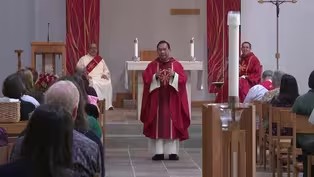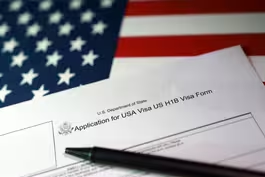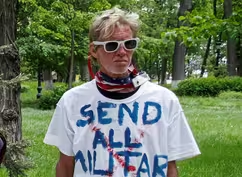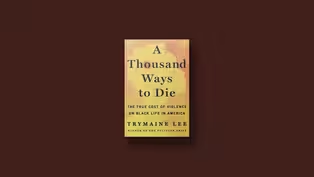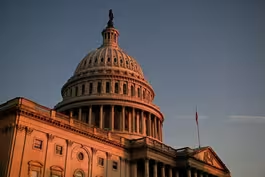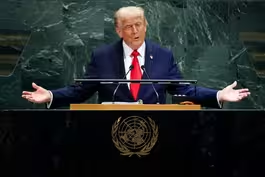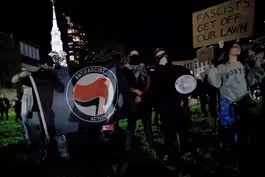
Why some stations won't air Kimmel's return to late night
Clip: 9/23/2025 | 6m 21sVideo has Closed Captions
Why some stations won't air Jimmy Kimmel's return to late night
Jimmy Kimmel returns to late-night less than a week after ABC suspended his show following his comments on the killing of Charlie Kirk. But two of the largest station ownership groups, Sinclair and Nexstar, say they won’t carry the program on their ABC affiliates. Kimmel’s suspension sparked protests and concerns about free speech. Geoff Bennett discussed more with Dylan Byers of Puck.
Problems playing video? | Closed Captioning Feedback
Problems playing video? | Closed Captioning Feedback
Major corporate funding for the PBS News Hour is provided by BDO, BNSF, Consumer Cellular, American Cruise Lines, and Raymond James. Funding for the PBS NewsHour Weekend is provided by...

Why some stations won't air Kimmel's return to late night
Clip: 9/23/2025 | 6m 21sVideo has Closed Captions
Jimmy Kimmel returns to late-night less than a week after ABC suspended his show following his comments on the killing of Charlie Kirk. But two of the largest station ownership groups, Sinclair and Nexstar, say they won’t carry the program on their ABC affiliates. Kimmel’s suspension sparked protests and concerns about free speech. Geoff Bennett discussed more with Dylan Byers of Puck.
Problems playing video? | Closed Captioning Feedback
How to Watch PBS News Hour
PBS News Hour is available to stream on pbs.org and the free PBS App, available on iPhone, Apple TV, Android TV, Android smartphones, Amazon Fire TV, Amazon Fire Tablet, Roku, Samsung Smart TV, and Vizio.
Providing Support for PBS.org
Learn Moreabout PBS online sponsorshipGEOFF BENNETT: Jimmy Kimmel returns to late night tonight.
The reversal comes less than a week after ABC suspended Kimmel's show following his comments on the killing of conservative activist Charlie Kirk.
But two of the largest station ownership groups -- that's Sinclair and Nexstar -- say they won't carry the program on their ABC affiliates nationwide.
Their boycott had been the driving force behind Kimmel's initial suspension, which had sparked protests and concerns about free speech, including hundreds of celebrities signing on to an ACLU letter supporting the late-night host.
For more, we're joined now by Dylan Byers.
He's senior media correspondent at Puck.
Dylan, welcome back to the "News Hour."
DYLAN BYERS, Puck: Thank you for having me.
GEOFF BENNETT: So before we get to this decision by some affiliates to preempt Kimmel's show, help us understand what ultimately convinced Disney CEO Bob Iger to bring Jimmy Kimmel back.
DYLAN BYERS: Well, the short answer here, Geoff, is extraordinary pushback, extraordinary pushback from the creative community in Hollywood, from the political community ranging from former President Obama to Senator Ted Cruz, even from Disney CEO Bob Iger's own predecessor, Michael Eisner.
So it was internal.
It was external.
And, look, we should add the caveat here, from the beginning, Disney was telegraphing to me, to other reporters that they had every intention of finding a resolution and bringing Jimmy Kimmel back to the airwaves.
But I think the speed with which they did it had a lot to do with the pressure that they were receiving for this decision, because it really did become an issue of free speech for a lot of people.
It became an issue about whether or not Disney was going to capitulate to pressure from the FCC, or at least pressure on its affiliate partners who would then pass that pressure along to him.
At a certain point, that became untenable for Bob Iger, and it became untenable for Disney and its brand.
GEOFF BENNETT: So, even though Disney has returned the show to the airwaves, you have got these two major broadcast groups.
The conservative leaning Sinclair Broadcast Group, this is the country's largest ABC affiliate owner.
They say that they're not going to air Kimmel's show.
Nexstar, another affiliate owner, says it will continue to preempt it.
What are their stated reasons?
And based on your reporting, what are their real reasons?
DYLAN BYERS: Yes, well, look, their stated reasons are that they are going to continue to monitor the situation and continue talking to Disney because they are uncomfortable with what Jimmy Kimmel had said on air, which is ostensibly the cause for all of this in the first place.
But you cannot extract the broader context here, of course, which is that, by Brendan Carr -- by FCC Chairman Brendan Carr going out and saying what he said initially, putting pressure on these affiliate groups to then put pressure on Disney, they all -- they have a vested interest in appeasing the FCC, right?
Nexstar has a $6.2 billion acquisition on the table that requires FCC approval.
Sinclair, as you mentioned, is conservative-leaning and does want to stay in the good graces of this administration.
Now, at the end of the day, it's their business and they can run it -- they can run it how they want to.
But I think it's pretty clear how transactional this has been for all of the businesses involved.
GEOFF BENNETT: And what does it reveal about the balance of power between the networks and the affiliate station groups that carry network programming?
DYLAN BYERS: Well, it reveals a lot.
I mean, if you look at Nexstar and Sinclair taking Jimmy Kimmel off the air, despite Disney doing what it's doing, you're looking at basically a quarter of the markets in the country, 25 percent, give or take, of the markets in the country where ABC is broadcast where Jimmy Kimmel's show will not be broadcast.
That is significant influence on the balance sheet for Disney.
So that is a significant amount of power.
Now, I would say, in terms of what leverage the FCC has over Disney in many ways, the most vulnerable media organizations are the ones with broadcast licenses, because that is where the FCC can exert its leverage.
That is where it can wield not just carrots, but sticks.
And that's not true for the broader media environment, generally speaking.
So we, as a country, I think right now are reckoning with this intense pressure campaign from this administration against legacy media outlets.
But the ones that are really vulnerable here, again, are those ones with broadcast licenses.
You have other media outlets that have been sued by the Trump administration, The Wall Street Journal, The New York Times.
They have far more power to stand up against this administration in a way that, if you're Disney and you have got theme parks that you want all Americans to go to, and you have got streaming services that you want every American with a kid to sign up for, you're just a lot more exposed to this pressure by virtue of the FCC's control over broadcast licenses.
GEOFF BENNETT: And with "The Late Show With Stephen Colbert" being canceled by CBS once his contract expires in May, now Jimmy Kimmel facing preemptions, as we have discussed, what does this all signal about the future of late night and broadcast television more broadly?
DYLAN BYERS: Yes, well, look, the dirty little secret here is that broadcast television generally is not on a strong foot.
And I don't think that the future of media, if you just look at the rise of digital platforms, social media platforms, streaming services, whether you're talking about the YouTubes or the TikToks, the future of media, news, satire, whatever you want, that future does not necessarily exist on broadcast or cable television.
So there is a degree to which this entire conversation, we can't ignore the backdrop, which is that late-night television is in decline.
You look at a Jimmy Kimmel, a Jimmy Fallon, a Stephen Colbert, that is unquestionably the last generation of sort of marquee names, celebrity names who are hosting late-night shows, if late night exists at all.
But lest that sounds like a dire future for anyone, I would also suggest that there will be plenty of satire out there in the media environment.
It just might not be happening on television.
GEOFF BENNETT: Dylan Byers, senior media correspondent at Puck.
Dylan, thanks again for your time.
DYLAN BYERS: Thank you, Geoff.
American bishop emerges as a new voice of the church
Video has Closed Captions
Clip: 9/23/2025 | 7m 59s | First American bishop appointed by Pope Leo emerges as a new voice of the Catholic Church (7m 59s)
How changes to H-1B visas could impact American businesses
Video has Closed Captions
Clip: 9/23/2025 | 8m 21s | How H-1B visa changes could impact American businesses and workers (8m 21s)
Man convicted of trying to assassinate Trump at golf course
Video has Closed Captions
Clip: 9/23/2025 | 3m 43s | Man convicted of trying to assassinate Trump at Florida golf course last year (3m 43s)
New book offers a personal and historical take on violence
Video has Closed Captions
Clip: 9/23/2025 | 8m 47s | 'A Thousand Ways to Die' offers a personal and historical take on the impact of violence (8m 47s)
News Wrap: Trump scraps meeting with Dems as shutdown looms
Video has Closed Captions
Clip: 9/23/2025 | 4m 58s | News Wrap: Trump scraps meeting with top Democrats as government shutdown looms (4m 58s)
Trump suggests Ukraine could reclaim territory from Russia
Video has Closed Captions
Clip: 9/23/2025 | 7m 1s | Trump suggests Ukraine could reclaim territory from Russia (7m 1s)
What is Antifa and why Trump calls it a terrorist group
Video has Closed Captions
Clip: 9/23/2025 | 4m 16s | What is Antifa and why Trump wants to label it a terrorist organization (4m 16s)
Providing Support for PBS.org
Learn Moreabout PBS online sponsorship
- News and Public Affairs

FRONTLINE is investigative journalism that questions, explains and changes our world.

- News and Public Affairs

Amanpour and Company features conversations with leaders and decision makers.












Support for PBS provided by:
Major corporate funding for the PBS News Hour is provided by BDO, BNSF, Consumer Cellular, American Cruise Lines, and Raymond James. Funding for the PBS NewsHour Weekend is provided by...
